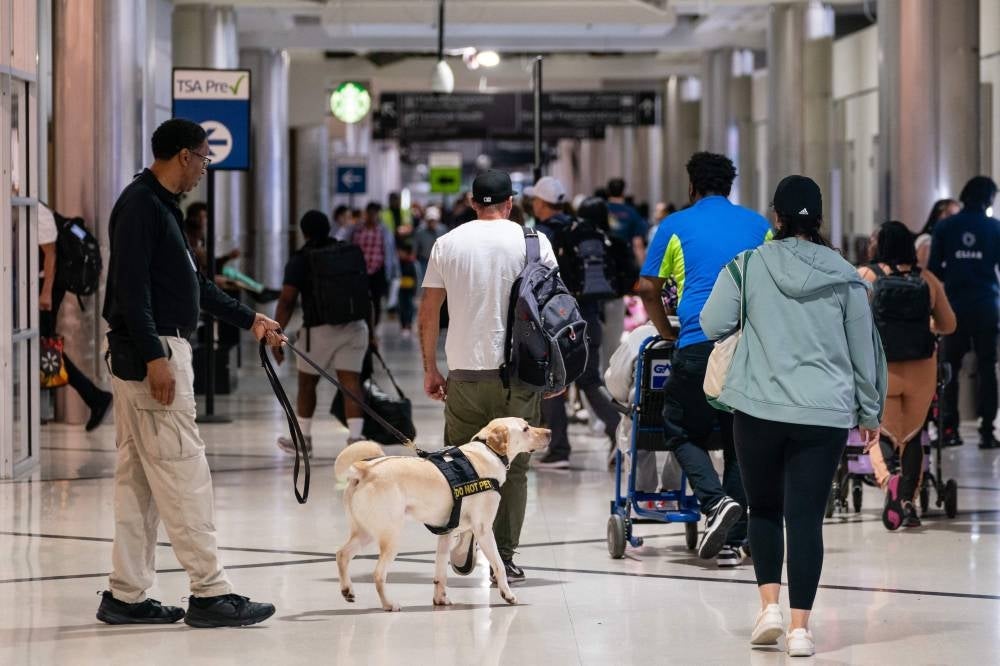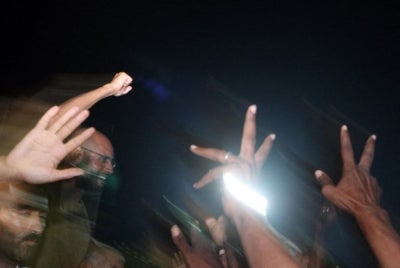Long waits as UK hit by guide dog shortage

LEAMINGTON SPA, United Kingdom - Charles Bloch remembers well the cold and wet December day seven years ago when he met his guide dog Carlo and they went on their first walk.
"I could see the benefits straight away. And I thought this will change so much for me," Bloch, who is registered blind, told AFP at a theatre in Coventry, central England, where he works.
Since then, the yellow Labrador-Golden Retriever cross has become "like my right-hand man", the 29-year-old said, describing his companion as "a bit cheeky" but "very much a hard worker".
Nine-year-old Carlo, however, is nearing the time to hang up his harness and go into retirement in the next couple of years.
Other guide dog owners retiring their dogs now are looking at a long wait for a replacement.
The Guide Dogs charity, the largest trainer of guide dogs in the UK, says a halt in puppy breeding and training during the pandemic has caused a "big backlog" of people waiting for a new animal.
"We couldn't train dogs. We couldn't train people. And then eventually, we were allowed to restart but in a very much phased, slow way," said Tony Murray, operations manager at the Guide Dogs centre in Leamington Spa, near Coventry.
He added that, as in other sectors, their staffing was affected following Brexit and certain roles, like guide dog trainers, are not easy to recruit for because what they do is "very unique".
Now the average wait for a guide dog is at least a year, "but probably more like 18 months and, in some cases, two years", he said.
- Restricting -
For Bloch, Carlo's retirement would mean going back to using a white cane.
"With Carlo it's just a simple breeze of a walk. I don't have to worry about stuff very much. I will tell him 'turn left', he'll turn left," he said.
When they are walking, Carlo, his harness on, navigates Bloch away from obstacles, lets him know when they approach a staircase or arrive at a road crossing.
Bloch, who still has some of his sight, said he would be able to get around with a cane, even if it will make him "a bit more limited".
But for those with no sight at all, losing their guide dog can be "very restricting", he added.
"They do feel like they are somewhat quite closed off from the world anyway," he went on.
"So not having a dog makes them feel even more that they would have to change their whole entire life and be a bit more of a recluse."
Murray said that their "ultimate aim" is to have a replacement waiting when a guide dog retires but they "can't just manufacture a dog on demand".
He said he is "very confident" that they'll be able to get back to where they were pre-pandemic but it will take time.
- Rewarding -
Breeding and training a guide dog is a months-long process.
At just a few weeks old, the puppies go to live with volunteers, who socialise them and give them their basic training.
When they reach the age of 12-14 months, the dogs start their formal training, which takes around 22 weeks.
If they are successful -- and the average success rate is currently at around 55-60 percent -- they are matched with a guide dog owner.
At the Leamington Spa centre, trainee guide dog Monte skilfully leads his handler, Zoey Scott, through an obstacle course of plastic road blocks and traffic cones.
The black 18-month-old dog taps his chin on a chair, indicating there is a place to sit down.
He is rewarded with a treat and praises of "good boy" for his hard work.
Scott said it takes "a lot of mental energy" from the dogs to go through the training but you "couldn't be prouder" when they nail a task.
And seeing the guide dog partnerships that are created is "really rewarding".
"Having met some of the guide dog owners that my training dogs have gone to, it's been really lovely to see how they've made a difference and being able to see the smiles on their faces," she said.
Bloch recalled that he felt "cut off from the social aspect" of university before he had Carlo and there was a "big barrier" to meeting new people.
"But having Carlo, that was that barrier knocked down pretty much in days because everyone wanted to say hello, everyone wanted to chat," Bloch said.
He said that he also improved his grades and graduated with first-class honours.
They walked on stage together during graduation.
"So that was the top tier, like I've done this because of Carlo," he said. - AFP
Download Sinar Daily application.Click Here!














